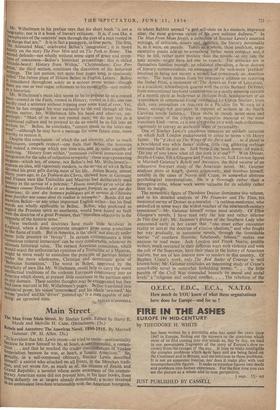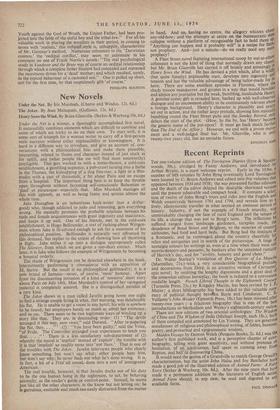The Man From Main Street. By Sinclair Lewis. Edited by
Harry E. Maule and Melville H. Cane. (Heinemann. 15s.)
. . and that he mocked the cruder manifestations of Yankee rnnerialism because he was, at heart, a fanatic American." So, genially, in a self-composed obituary, Sinclair Lewis described 11)111-self: a satirist who attacked on all fronts, in the Mencken tradi- tion, and yet wrote for, as much as of, the citizens of Zenith and Grand Republic; a novelist whose acute awareness of the contem- porary American scene did not prevent him, in his later books, from §ing defiantly on at targets already demolished; a writer involved In an ambivalent love-hate relationship with the American bourgeois, to whom Babbitt seemed "a god, self-slain on h.s modern, improved altar, the most grievous victim of his own militant dullness." In The Man From Main Street, a collection of Sinclair Lewis's assorted writings, of criticism, essays andA4etches, the literary personality is, as it were, on parade. Taken as a whole, these confident, argu- mentative pieces add up to something rather more compiex and, it may be felt, rather more positive than the novels—at any rate the later novels—might have led one to expect. The attitudes are in themselves familiar enough: an educated liberalism, a fiei ce distrust of literary commercialism, an awarQess of the well-worn 'problem' involved in being not merely a write,- but consciously an American writer. The book moves from his impressik e address on receiving the Nobel Prize, a statement of `The American Fear of Literature,' to a truculent, schoolboyish quarrel with the critic Bernard DeVoto; from conventional boyhood reminiscence to a neatly amusing account of a month spent as boilerman at Helicon Hall, headquarters of an 'experiment in communal living' conducted Ly Upton Sinclair; from slick, easy journalism on America as a Pal adise for W(,men to a bitter, strongly-felt pamphlet in support of' strikers in ill.; North Carolina textile factories. These shifts in mood, seriot sncss and quality—some of the articles are magazine material of the most transitory kind—serve, as is not alwAys the Cr.'t with such collections, vigorously to convey an authentiE sense of personality.
One of Sinclair Lewis's anecdotes concerns an unlikely occasion on which Jack London endeavoured to come to terms with Henry James. He "p:ckcci up The Wings of the Dove and ... re: .d aloud in a bewildered way while James' sliding, slitla ring, glittering verbiage unwound itself on and on. Jack banged the book down ; nd wailed; `Do any of you know what all this junk is at out?'" With Dreiser, Stephen Crane, Elk n Glasgow and_Frank Norris, Jack London figure's in Maxwell Geismar's Rebels and Ancestors, the third volume of an exhaustive five-part study of the American novel. Mr. Geismar analyses plots at length, quotes extensively, and involves himself, notably in the cases of Norris and Crane, in somewhat abstruse psychological interpretations. He is a thorough rather than a perceptive critic, whose work seems 'valuable for its solidity rather than its insight.
The monolithic figure of Theodore Dreiser dominates this volume, and in his detailed analysis of The Financier and The Titan, 'his measured survey of Dreiser as a moralist—"a ruthless modernist, who embodied in some ways the widest reaches of the nineteenth-century conscience"—Mr. Geismar himself writes most acutely. Of Ellen Glasgow's novels, I have read only the late and rather inferior In This Our Life; Mr. Geismar's picture of the Southern Lady who announced early in her career that "one must either encounter reality or accept the doctrine of evasive idealism," and who fought her way gradually, in successive novels, through the formidable barrier "of southern illusions, falsehoods, taboos," makes one anxious to read more. Jack London and Frank Norris, prolific writers, much occupied in their different ways with violence and with the cult of the Superman, have their place in the history of American realism, but are of less interest now to readers in this country. Of Stephen Crane's work, only The Red Badge of Courage is well known here; Mr. Geismar concludes an interesting study of Crane's remarkable novel in somewhat forbidding terms: ". . . the little parable of the Civil War concealed beneath its moral and social' levels" a "religious and oedipal conflict. . . . The rebellion of the Youth against the God of Wrath, the Unjust Father, had been pro- jected into the fable of the sinful boy and the tribal-law." For all his valuable work in placing the novelists in their period, in coming to terms with 'realism,' this inflated style is, unhappily, characteristic of Mr. Geismar's method. Numerous references to the 'Darwinian cosmos,' the 'oedipal conflict,' may seem to culminate in his comment on one of Frank Norris's novels: "The real psychological study in Vandover and the Brute was of course an oedipal relationship through which a complete father fixation had concealed and repressed the incestuous drives for a 'dead' mother; and, which resulted, surely, In the typical behaviour of a castrated son." One is pulled up short, not for the first time, by that suspiciously glib 'of course.'
PENELOPE HOUSTON



































 Previous page
Previous page